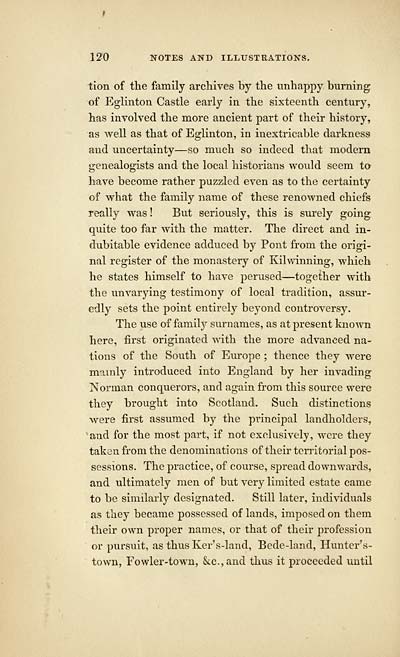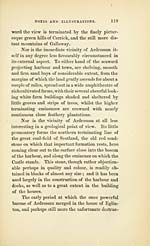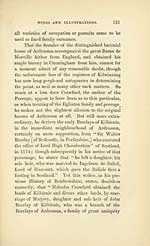Historical memoir of the family of Eglinton and Winton
(142) Page 120
Download files
Complete book:
Individual page:
Thumbnail gallery: Grid view | List view

120 NOTES AND ILLUSTRATIONS.
tion of the family archives by the unhappy burning
of Eglinton Castle early in the sixteenth century,
has involved the more ancient part of their history,
as well as that of Eglinton, in inextricable darkness
and uncertainty — so much so indeed that modern
genealogists and the local historians would seem to
have become rather puzzled even as to the certainty
of what the family name of these renowned chiefs
really was ! But seriously, this is surely going
quite too far with the matter. The direct and in-
dubitable evidence adduced by Pont from the origi-
nal register of the monastery of Kilwinning, which
he states himself to have perused — together with
the unvarying testimony of local tradition, assur-
edly sets the point entirely beyond controversy.
The use of family surnames, as at present known
here, first originated with the more advanced na-
tions of the South of Europe ; thence they were
mainly introduced into England by her invading
Norman conquerors, and again from this source were
they brought into Scotland. Such distinctions
were first assumed by the principal landholders,
and for the most part, if not exclusively, were they
taken from the denominations of their territorial pos-
sessions. The practice, of course, spread downwards,
and ultimately men of but very limited estate came
to be similarly designated. Still later, individuals
as they became possessed of lands, imposed on them
their own proper names, or that of their profession
or pursuit, as thus Ker's-land, Bede-land, Hunter's-
town, Fowler-town, 8cc.,and thus it proceeded until
tion of the family archives by the unhappy burning
of Eglinton Castle early in the sixteenth century,
has involved the more ancient part of their history,
as well as that of Eglinton, in inextricable darkness
and uncertainty — so much so indeed that modern
genealogists and the local historians would seem to
have become rather puzzled even as to the certainty
of what the family name of these renowned chiefs
really was ! But seriously, this is surely going
quite too far with the matter. The direct and in-
dubitable evidence adduced by Pont from the origi-
nal register of the monastery of Kilwinning, which
he states himself to have perused — together with
the unvarying testimony of local tradition, assur-
edly sets the point entirely beyond controversy.
The use of family surnames, as at present known
here, first originated with the more advanced na-
tions of the South of Europe ; thence they were
mainly introduced into England by her invading
Norman conquerors, and again from this source were
they brought into Scotland. Such distinctions
were first assumed by the principal landholders,
and for the most part, if not exclusively, were they
taken from the denominations of their territorial pos-
sessions. The practice, of course, spread downwards,
and ultimately men of but very limited estate came
to be similarly designated. Still later, individuals
as they became possessed of lands, imposed on them
their own proper names, or that of their profession
or pursuit, as thus Ker's-land, Bede-land, Hunter's-
town, Fowler-town, 8cc.,and thus it proceeded until
Set display mode to:
![]() Universal Viewer |
Universal Viewer | ![]() Mirador |
Large image | Transcription
Mirador |
Large image | Transcription
Images and transcriptions on this page, including medium image downloads, may be used under the Creative Commons Attribution 4.0 International Licence unless otherwise stated. ![]()
| Histories of Scottish families > Historical memoir of the family of Eglinton and Winton > (142) Page 120 |
|---|
| Permanent URL | https://digital.nls.uk/94848958 |
|---|
| Description | A selection of almost 400 printed items relating to the history of Scottish families, mostly dating from the 19th and early 20th centuries. Includes memoirs, genealogies and clan histories, with a few produced by emigrant families. The earliest family history goes back to AD 916. |
|---|

